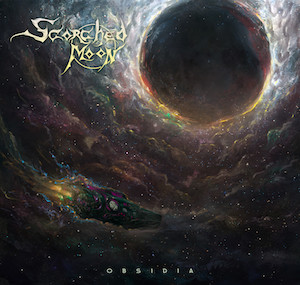There has been much buzz around Scorched Moon’s first full-length and with good reason. Formed in 2012 as a two-man project by Trapper Lanthier and Scott Helmreich in Savannah, GA, the band went on hiatus in 2014 when Helmreich left. 2016 saw Lanthier relocate to Atlanta, GA and with that, the resurrection of the band. The first 2 tracks for Obsidia were released in November 2018 on their EP Prologue, followed by the single for “Triumph and Tragedy” in May 2022. Now in March 2023, the full-length debut has come to fruition. Enough history though, let’s talk about this album.
As a Trekkie and overall sci-fi fan myself, there’s great appreciation for any music themed around space. The only thing that could have made the theme better is if it had been released exactly 2 weeks later on First Contact Day (we are 40 years away, by the way). Aside from the theme, the first thing to jump out is how well this band melds together; everything sounds tight and well crafted. It’s clear all these artists are very talented and work very well together. Speaking to that point, all members also take on some vocal duties. Lanthier does all the harsh vocals and much of the clean, while the rest lend their voices into the harmonies. Keyboardist Matthew Boatwright extends his talents to the vocal realms as well, most notably on “K-186f” and “Silence Painted Crimson” (along with guest vocalist Vincent Jones of Æther Realm). The vocals as a whole sound like a cross between Heri Joensen (Týr) and Hansi Kürsch (Blind Guardian), being two of this writer’s favorite vocalists, it’s safe to say the ears were pricked. One minor criticism, which is more of a personal preference, is the layering of the vocals. The intended effect of the harmonies can at some points feel overly produced – less layers would have been preferable, but again, this is a negligible critique and most of the time the effect hits its mark.
“Lost Adrift” sets the tone for the record immediately with a clean guitar that gives an atmospheric vibe. This quickly transitions into an upbeat, distorted guitar overlayed with a sanguine keyboard tone. This transition between the heavy to the light happens a couple times and it’s clear there are a lot of layers that’ll need to be peeled back. Clearly this will be an album that can be listened to many times, each with new discoveries. Now there’s “No Turning Back,” which kicks off with a very prog rock feel. Upon first listen, the contrast between the first and second tracks seemed almost disjointed, but subsequent listens caused it to really sink in and click for this scribe. “Light of Day” feels like it could be at home on a Týr album (minus the folk elements), or even Seventh Wonder.
“Violence” layers the harsh and clean vocals brilliantly, with a soaring guitar solo launching into a keyboard lead that takes the listener to the stratosphere. Speaking of the keyboards, they often remind one of Savatage in their beautifully haunting melodies. This is present throughout, but most of all on “Triumph and Tragedy” and “Doubt” where it feels truly as if they are reaching through time and space to touch your soul. “Silence Painted Crimson” even appears to have a section inspired by “In the Hall of the Mountain King” by Edvard Grieg (from the 1876 play Peer Gynt); this of course also was done by Savatage on “Prelude to Madness.” If the band members aren’t Savatage fans, then this is just an amazing happy coincidence. “K-186f” showcases the amazing bass work of Michael Sanders, with a pulsating lead to start out and a defined prominence for the duration of the song. The drumming of Jade Edge is always pronounced, but really shines on “Beyond the Singing Stars” with a drum beat that marches at times and blasts off into the galaxy the rest of the time.
If the goal was to create music that is like the vast reaches of space, in that you can get lost in it and always be unearthing something new, then Scorched Moon has succeeded with Obsidia. Here’s to hoping they continue to go boldly into these musical dimensions and give us many more amazing albums.


